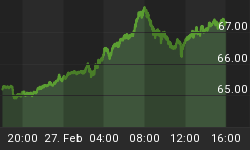Despite growing concerns about the growth in Federal spending, voiced this week by none other than Warren Buffett, Washington seems determined to keep its foot on the money pumping accelerator for as long as it can. But even though Washington continues to ignore the realities, alarm bells are beginning to ring at town halls across the country.
Last week the Fed left its key short-term rates frozen at 0 to 0.25 percent, enabling banks to borrow at near zero and reap spreads as high as 6 to 24 percent. The Fed also continued its policy of paying interest on banks' reserves, further boosting Wall Street's bottom line. The government has decided to save the banks, no matter how much the public has to suffer.
Worse still, the Administration has been largely silent over the obscene bonuses paid by banks to the very executives whose 'casino' mentality caused a financial crisis that the IMF now estimates has cost the world some $7 trillion. At financial firms that have received bailout money, it has been estimated that thus far in 2009 bonuses paid to executives have exceeded profits.
However, with the pedal still hitting the metal, the Fed has begun to discuss plans of a so called "exit strategy" that would pave the way toward higher interest rates.
These statements of economic neutrality were based upon the Fed's impression that the recession is ending. But the Fed has not yet taken any meaningful actions to curb its potentially inflationary policies.
For now mere words are enough to encourage American stock markets, but only briefly. More recently, U.S. equity investors gradually are facing up to the fact that, while stock prices rose recently by some 45 percent, earnings, although "ahead of estimates", have fallen by almost 30 percent, despite savage cost cutting and deep inventory depletion. The more important top line revenues have fallen by about 15 percent and free cash flows are tumbling in response.
The public, who feel the vicious bite of 'real' 20 percent unemployment (rather than the official rate of 9.8 percent), are becoming increasing distrustful of big government and deeply resentful of its increasing grasp of their lives. The cracks are beginning to show.
A key element of the Obama Administration is its 1,000-page health care reform bill. Despite the impossibility of reading, let alone understanding, the legislative behemoth, Obama tried forcefully to push it through Congress in just two weeks.
And, despite the clear failure of government healthcare in many parts of the world, including domestically in Massachusetts, the Administration is still looking to move ahead with a public option plan.
The public is not yet willing to play ball. While much of the biased media paint the rowdy town hall meetings across the country as merely the clumsy machinations of the Republican Party, the events are revealing the deep misgivings average Americans have about the growth of government. If this movement spreads, it could have a dramatic and healthy effect on the American economy in the long-term.
At their core, Americans hold individual freedom and self-reliance dear. Therefore, by nature, they are not socialists and resent big government. To them the actions of the Administration, supported by a compliant Congress, are clear: use massive amounts of public funds to support the financial elite, maintain massive entitlement spending to secure votes, and extend the grasp of big government through healthcare and other measures. Their anger is justified.
President Obama campaigned on political 'change' and an end to the abuse of taxpayers. So far, he has massively increased government entitlement spending and has failed to loosen Congress's firm grasp of the pork barrel.
It may be that the deep resentment expressed in town halls will embolden ordinary people to pressure Congress to stop the train. If that happens, America will begin the long and painful road towards economic restructuring, individual freedom and enterprise. Under those conditions America would represent a great investment opportunity.
For a more in-depth analysis of our financial problems and the inherent dangers they pose for the U.S. economy and U.S. dollar, read Peter Schiff's 2007 bestseller "Crash Proof: How to Profit from the Coming Economic Collapse" and his newest release "The Little Book of Bull Moves in Bear Markets." Click here to learn more.
More importantly, don't let the great deals pass you by. Get an inside view of Peter's playbook with his new Special Report, "Peter Schiff's Five Favorite Investment Choices for the Next Five Years." Click here to dowload the report for free. You can find more free services for global investors, and learn about the Euro Pacific advantage, at www.europac.net.















